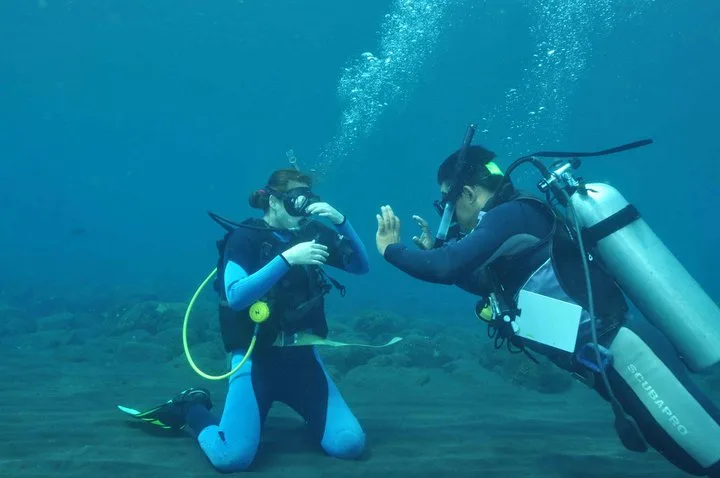Want to learn how to dive or try scuba diving? Check out these essential diving tips for beginners from Cadventura!
Have you ever tried diving or scuba diving? If not, you can’t just dive in without proper training. Why? Because underwater, your body loses heat 20 times faster than on land. That’s why you need proper insulation for a safe and comfortable dive. Imagine diving without any training—your body would get much cooler than usual, which is not safe!
So, what if you’ve never dived or taken diving courses? Don’t worry! We’ve got some great diving tips for beginners to help you get started. Ready to dive in? Let’s explore these essential diving tips for beginners!

Perform the Correct Entry Procedure
The first basic diving tip concerns the entry process. Entering the water can be both exciting and nerve-wracking. You can either put on your SCUBA gear or jump in with it already on. As a beginner, it’s recommended that you put on your scuba gear.
Listen to and Follow Instructions from Your Instructor/Dive Master
You’ll receive detailed instructions on basic diving techniques, from using the oxygen mask to checking the oxygen levels in your tank. The explanations might seem long and boring, but they’re crucial. Pay close attention and don’t hesitate to ask questions if you’re unsure about anything.

Choose the Right Diving Gear
Having the right diving gear is essential for exploring the underwater world. Properly fitting goggles and equipment are especially important for beginners. If water gets into your mask, it can be uncomfortable and cause panic underwater.
When fitting your gear, check the tightness of your goggles. Bend over to see if the mask feels loose. Tighten the mask strap before entering the water. If water does get in, lift your head slightly, remove the mask, and blow the water out through your nose. Practice this before your actual dive.
Move and Breathe Correctly
One of the most important diving tips is to never hold your breath underwater. Sometimes, you might unconsciously hold your breath while exhaling through your mouth, which can be dangerous and cause lung injuries.
Your body position affects your buoyancy and movement in the water. Stay relaxed and move at your own pace—there’s no rush in beginner diving. Use your arms and legs efficiently to conserve energy and avoid fatigue.
Keep your movements simple and avoid unnecessary actions. Once you’re in the water, you’ll usually stop to check your equipment.

Learn Hand Signals
You can’t talk underwater, so hand signals are essential for communication. Learn and memorize these signals carefully, as using the wrong one can lead to misunderstandings.
Equalize Your Ears with Water Pressure
Equalizing the pressure in your ears with the surrounding water is crucial. You can do this by pinching your nose and gently blowing air through it while keeping your mouth closed. Swallowing can also help, especially for experienced divers. Equalize frequently, ideally every meter, even if your ears don’t feel uncomfortable.

Stay Close to Your Instructor/Guide
While it’s tempting to explore the underwater world on your own, don’t stray too far from your guide. As a beginner, you’re more prone to encountering problems than experienced divers. Accidents can happen if you’re far from your guide, and the mesmerizing coral reefs might make you lose track of your surroundings. To avoid getting lost or caught in currents, maintain a safe distance from your guide.
Pass the Certification Test
Before diving, you should pass a diving certification test, which you can take with organizations like PADI or CMAS. These courses teach you the essential skills and techniques for safe diving.
What do you think of these diving tips for beginners from Cadventura? Are you interested in diving or scuba diving? Once you master diving, you can explore some of the best diving spots in Indonesia, which are just as beautiful as those abroad!


